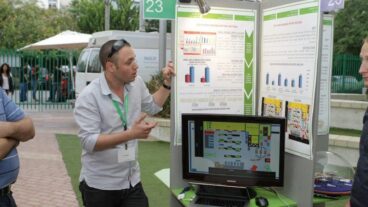Dr. Yuval Gielchinsky: From our statistical model it appeared that we were looking at women with a genetic advantage.American women are increasingly putting off having babies until later in life for a variety of reasons – focus on career, lack of a suitable mate, desire for freedom.
Now, a team of Israeli obstetricians and fertility researchers are suggesting that a small group of women may have a unique genetic advantage that delays the normal aging of their ovaries and eggs, and allows them to remain fertile throughout their 40’s.
Writing in the latest issue of Fertility and Sterility, Prof. Neri Laufer and Dr. Yuval Gielchinsky of the Hadassah University Medical Centers in Jerusalem – along with colleagues from Shaare Zedek Medical Center and Bikur Holim Hospital – reported on 209 women who had children between 1995 and 2000 after the age of 45 without any fertility treatment.
“We initiated this research after seeing that nearly all of our patients trying for their first few children, do not conceive naturally over the age of 45, and that it is common knowledge that this is the end of age of fertility,” Dr. Gielchinsky told ISRAEL21c. “And yet, as doctors in Israeli hospitals in Jerusalem, we have had the opportunity to regularly observe women in unique populations in their mid- to late-40’s who have conceived naturally who comes to deliver.”
According to Gielchinsky, these women have a unique social profile. Most have more than 10 children – sometimes even their 19th or 20th child. And they are usually from an ultra-Orthodox Jewish culture or traditional Arab background that – seeing maximum production of children as a religious value – does not endorse the use contraception.
In many ways, these women were an aberration. Their miscarriage rate was surprisingly low. The reasons for increased miscarriages – and rapidly decreased fertility after the age of 39, is the decline in the quality of a woman’s eggs, which leads to errors in the DNA and chromosomes. But, unlike other women their age, who tend to miscarry relatively frequently, their rate was as low as that of a 20-year-old woman – and their rates of genetic abnormalities was also unusually low for older women.
According to statistics, the probability of a woman getting pregnant per menstrual cycle between the age of 27 to 29 is 30%, while that of doing so between 35 and 39 is only 15%. Babies are rarely conceived by women over 45 if they have not had fertility treatments.
The doctors explored two theories for the phenomenon – the first one was the possibility that these women kept their fertility alive by continually using their childbearing equipment.
“We thought perhaps that the multiple pregnancies had some kind of a protective effect, that something is preserving her fertility,” said Gielchinsky.
But increasingly, as they examined the population and ran it through statistical models, they became convinced that they were looking at women who were simply genetically programmed for extreme fertility and reproduction ability throughout their life – genes that are not normally observed in the population because most women do not have their lifestyle.
“From our statistical model it appeared that we were looking at women with a genetic advantage,” said Gielchinsky.
Their theory was borne out when they moved out of Jerusalem and performed similar observations of Bedouin women in the Negev, who lived a similar reproductive lifestyle, and similarly, produced a small group of women able to bear healthy children later in life.
“It might be suggested that the protective mechanism unique to this group seems to be a genetic positive predisposition that is exposed by a distinct cultural background that encourages continuous fertility,” explained Gielchinsky.
As they follow up on the study, the researchers are now “trying to characterize the genes that are involved in this advantage,” he added.
While it is remotely possible that eventually this could lead to a gene-driven ‘cure’ for infertility for women in their 30’s and 40’s, what is more likely, he said, is that it may help doctors find a way to identify each woman’s “genetic fingerprint” of fertility and be able to tell her with a degree of certainty when her fertility will end.
This will allow her to make her childbearing decisions accordingly – in some cases, affecting their decision whether or not to delay having children.












